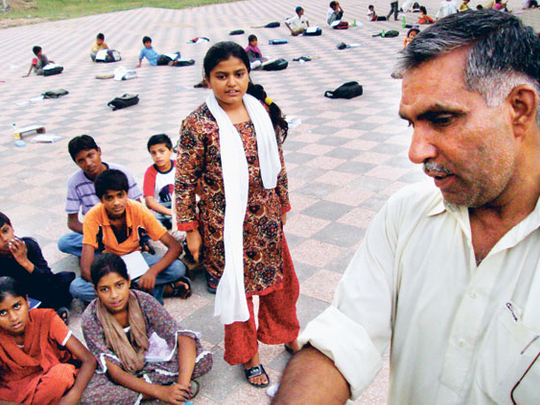
Islamabad: In a land of stark contradictions, where some need fake university degrees to reach the highest echelons of power — most often to serve themselves — others remain oblivious to this fact and continue to affect the lives of other people, for the better.
In a rare verification process, which is ongoing, more than 50 parliamentarians have allegedly benefited from the underground market of fake graduation ‘degrees', including those that serve in the medicine and engineering sectors.
Just beneath the shadows of the presidential palace and the parliament, a man in his late 40s lives a quiet yet eventful life.
He has changed the lives of thousands of slum-dwellers by sacrificing his own lifestyle and meagre resources.
Meet Mohammad or Master Ayub, a saviour for Islamabad's slum-dwellers whose ugly habitat remains unmistakably visible to the naked eye but is yet to be unacknowledged by the country's elite.
For the past 26 years, this trained fireman from central Punjab's Mandi Bahauddin town has been imparting free education to youth hailing from the capital's most-neglected Christian community.
Located in the vicinity of Islamabad's Super Market ‘Master Ayub Second Shift School' has interesting yet indifferent neighbours — the Federal Minister for Railways Ghulam Ahmad Bilour at the back and three federal secretaries' homes at the front.
Dedicated
"At 4pm for over two decades, I ride my bicycle and head to this park where on an average 250-odd children wait for me with their school books," Ayub tells Gulf News, as he carefully checks a 10th grader's homework.
In this recently-cemented part of the park, boys and girls from various ages sit with their school bags on the right and their water bottles on the left.
"The youngest one here is about four years old while the eldest would be 18," Ayub says with a humble but contended smile.
Recently, Pakistan media has been relentlessly showcasing Ayub's success story, with the main intention of putting the politicians and bureaucratic elite to shame. "The students keep changing but my routine and goals don't," Ayub, who admits to being publicity-shy says.
"The lousiest of my students can at least read and write... we enable them to run a small shop... while the good ones have joined government service in junior grades as well as officer cadres. Some have entered professions like nursing and [work for] Urdu-language newspapers," the self-styled educationist says.
"My sons Khalid and Mudassir could only pass 10th grade while my daughter Sobia is following my tradition in Mandi Bahauddin after completing her Master's degree in Mathematics," Ayub said.
Despite Pakistan's high inflation which is marred by corruption, mismanagement and more recently terrorism, Ayub — who does not earn more than $300 (Dh1,101) a month — manages to run his ‘school' surprisingly well.
Three parts
"I divide my salary into three parts with one for my aging mother and widowed sister, the other for my wife and daughter, and the third one for myself and my school," Ayub said.
Be it the humid summers of July or the freezing winters of January, Ayub's determination does not require a pedestal fan or a gas heater to stay intact.
Even during the current and worst rainy season, pupils at the school remain oblivious to the word ‘vacations'.
Ayub's charisma did attract modestly-educated colleagues and some highly-qualified youth of the capital to volunteer to teach at his school. However, impressing the elite and influential to procure much much needed funds continues to remain an unrealised dream.
"Some people in this Christian Colony got funds in the school's name without my knowledge and so did an NGO some years ago. The money was later withdrawn on complaints," Ayub recalls.
Ironically, he could not qualify for the same funding while the fake NGOs could.
Though he never expected a salary for his services, the schools' ledgers list hundreds of thousands rupees Ayub has spent over 26 years on the school as a loan.
"Instead of paying back my loan, I want a three-room school building with some durable furniture and stationary," Ayub says.












